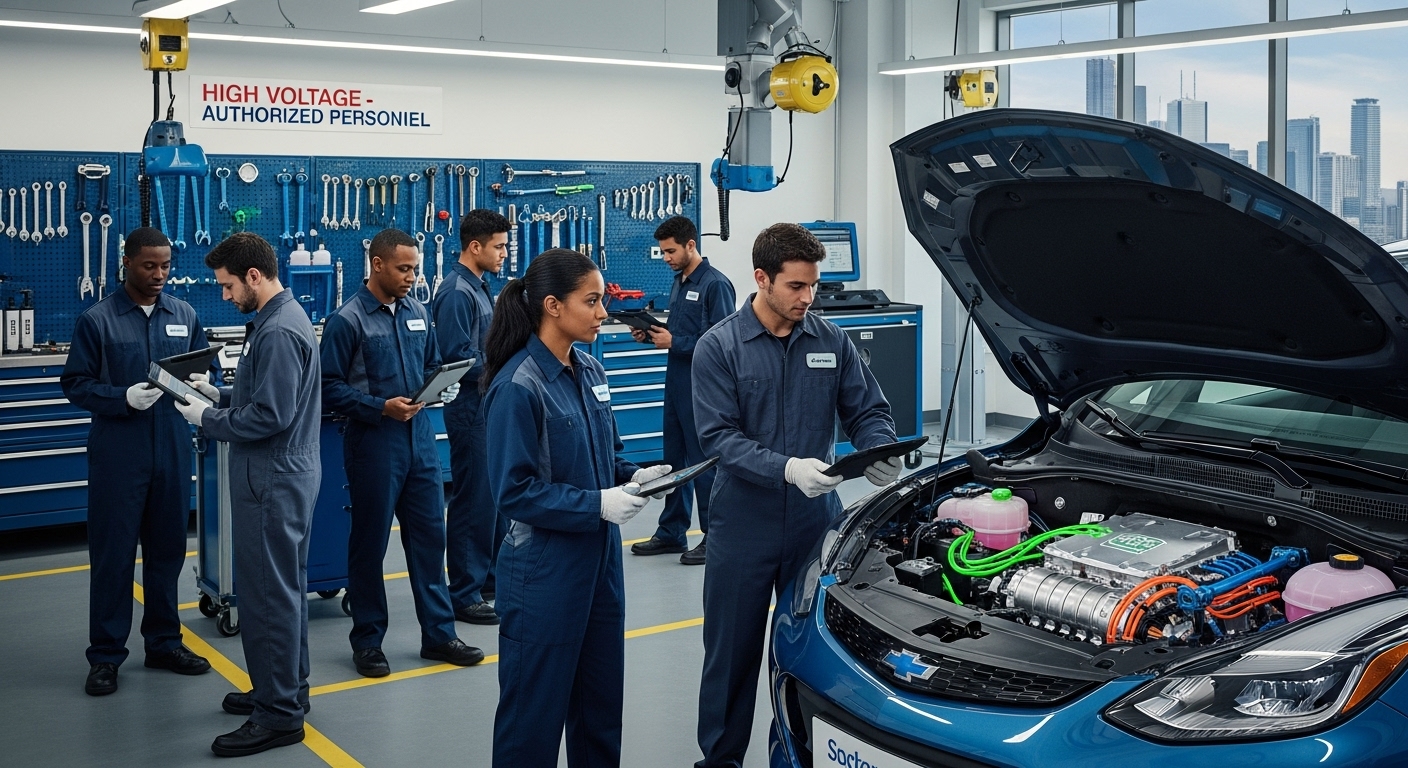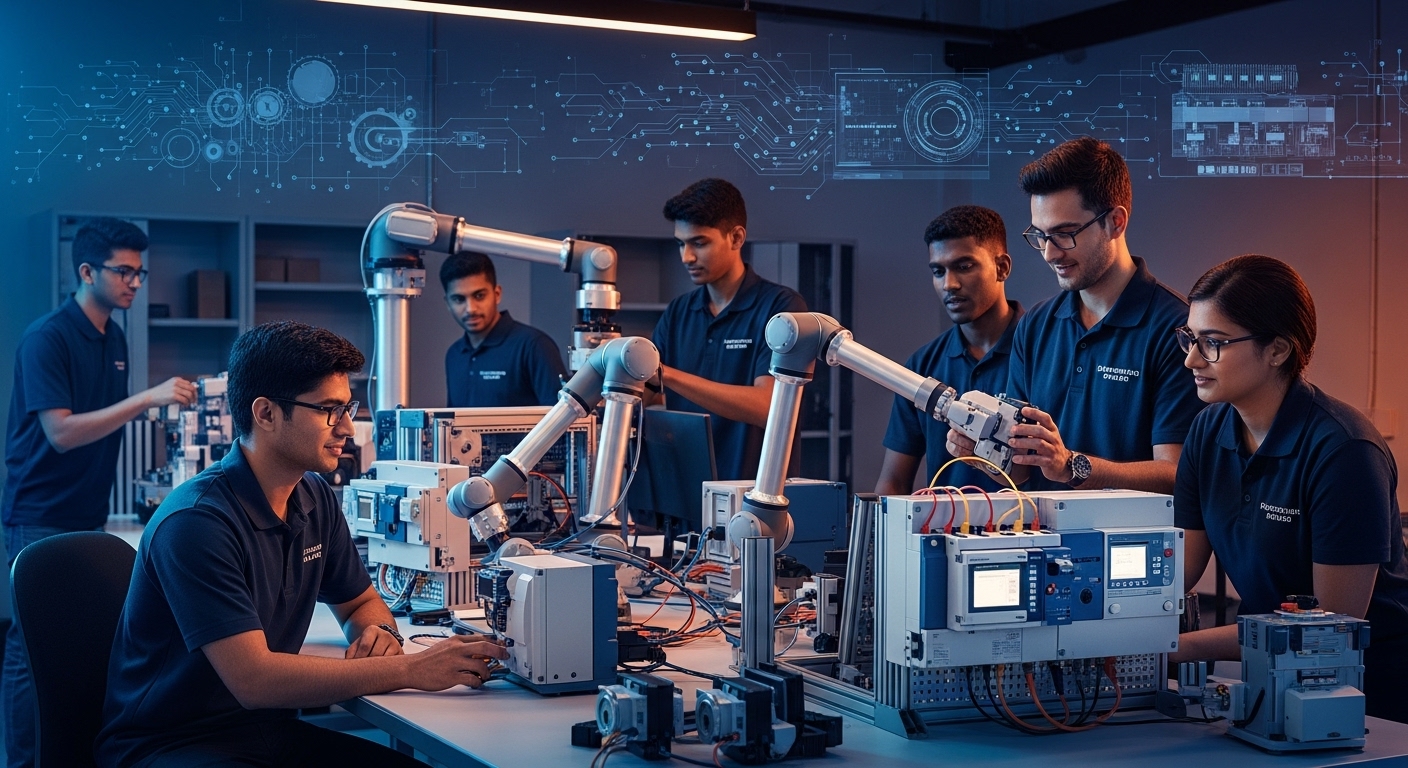Electric Vehicle Technician Training in Toronto

Canada’s roads are changing fast, and so are the skills needed to keep vehicles running. With more Canadians switching to electric vehicles (EVs) every year, the demand for qualified EV technicians is skyrocketing. Toronto, as the heart of Canada’s automotive innovation and one of the fastest-growing EV markets, is becoming a hub for electric vehicle technician training.
The government’s national Zero-Emission Vehicle (ZEV) targets and green jobs initiatives mean this isn’t just a trend, it’s the future of Canada’s workforce.
Whether you’re a recent high-school graduate, an experienced auto mechanic looking to upskill, or someone passionate about sustainability and clean tech, learning how to service and maintain EVs can open the door to a high-demand, future-proof career.
Why You Should Read This Guide
If you’ve been asking:
“How do I become an electric vehicle technician in Toronto?”
“What’s the best EV training program near me?”
“Do I need certification or apprenticeship hours to work on EVs in Canada?”
you’re in the right place.
This guide breaks down everything Canadians need to know about becoming an electric vehicle technician, from top-rated training programs in Toronto to certifications, salaries, and career opportunities.
By the end, you’ll have a clear roadmap for entering one of Canada’s fastest-growing skilled trades, and helping drive the nation’s clean-energy future.
The Role of an EV Technician
As someone who’s been around Toronto’s growing EV scene for a while, I can tell you the electric vehicle technician role is not your traditional auto mechanic job.
EV technicians are trained to diagnose, repair, and maintain electric vehicles — everything from battery packs and high-voltage wiring to charging systems and software diagnostics. The job blends electrical engineering principles with hands-on automotive work.
Unlike standard mechanics, who mainly deal with internal combustion engines (ICE), EV techs focus on:
High-voltage systems — safely handling power systems up to 800 volts.
Battery management — testing, balancing, and replacing EV batteries.
Charging and electronics — troubleshooting issues with charging stations, connectors, and onboard chargers.
Software updates — understanding how firmware and diagnostic tools affect vehicle performance.
It’s a perfect career path if you’re tech-savvy, curious about clean energy, and enjoy working with your hands. As EV adoption rises across Canada, certified EV technicians are quickly becoming one of the most in-demand skilled trades in the automotive sector.
Why Toronto is a Prime Location for EV Training
Toronto is one of the best places in Canada to start your journey as an electric vehicle technician, and here’s why.
First, Ontario is a leader in EV manufacturing and innovation. Companies like General Motors, Ford, and Stellantis have made huge investments in electrifying their Canadian operations. In fact, GM’s Oshawa plant (just east of Toronto) has expanded into EV assembly, and suppliers in the Greater Toronto Area (GTA) are following suit.
Second, the provincial government and the City of Toronto are both heavily investing in electric mobility infrastructure. Public charging networks are growing rapidly, with Toronto Hydro and FLO partnering on local charging projects. That means more need for qualified technicians to install, maintain, and service these systems.
Finally, Toronto’s colleges and trade schools are ahead of the curve. Programs here don’t just teach theory, they connect you with real-world experience through co-ops and apprenticeships. Plus, being in Toronto gives you access to an active EV community, from startup innovators to electric fleet operators.
If you’re serious about working in this field, there’s arguably no better Canadian city to learn, network, and grow than Toronto.
Top EV Technician Training Programs in Toronto
Toronto has some of the best EV technician training programs in the country, with options for every level, from beginners to licensed mechanics looking to upgrade their skills.
1. Centennial College – Electric Vehicle Technician Certificate
Centennial is a front-runner in EV education. Their Electric Vehicle Technician Certificate program is available both online and in-person, designed for those who want flexibility. The curriculum covers everything from battery pack architecture to regenerative braking and diagnostic software. It’s hands-on, accessible, and well-recognized across Canada.
Website: schoolofengineeringtechnology.centennialcollege.ca
2. George Brown College – Automotive Service Technician (EV Stream)
George Brown’s program takes a deep dive into EV and hybrid vehicle systems as part of their automotive service technician pathway. Located right in downtown Toronto, the college has a strong partnership with industry players, meaning students often get exposure to real dealership settings and manufacturer-backed training.
Website: georgebrown.ca
3. Humber College – Advanced Automotive Technology (Hybrid & EV Focus)
Humber’s north campus features one of Ontario’s most advanced automotive labs. Their program blends traditional mechanical training with high-voltage safety, diagnostics, and charging station technology. Graduates come out ready to work in dealerships, fleet services, or even EV startups.
Website: humber.ca
4. Electric Vehicle Infrastructure Training Program (EVITP Canada)
This one’s for electricians and tradespeople looking to specialize in EV charging station installation. EVITP is a nationally recognized certification supported by the Canadian Standards Association (CSA) and Natural Resources Canada. If you’re interested in installing and maintaining EV chargers, this is the course for you.
Website: evitp.org
Tip from a Local Tech Enthusiast:
If you’re in the GTA, consider visiting college open houses or career fairs, many institutions run EV demo labs or have partnerships with local dealerships like Tesla, Ford, and Hyundai. Getting face-to-face with instructors or alumni can help you choose the best fit for your career goals.
EV Technician Certification Pathways in Canada
If you’re thinking about becoming an electric vehicle technician in Canada, understanding the certification process is key. Unlike general auto mechanics, EV techs deal with high-voltage systems that demand specialized training and safety compliance.
In Canada, the pathway typically starts with an Automotive Service Technician (AST) Red Seal certification, which allows you to work across provinces. Once you have that base, you can branch into EV-specific credentials.
One of the most recognized programs is the Electric Vehicle Infrastructure Training Program (EVITP), a national certification endorsed by Natural Resources Canada (NRCan) and supported by major automakers. It focuses on safe installation and maintenance of EV charging stations, electrical theory, and workplace safety for high-voltage systems.
Some colleges in Ontario have also integrated EVITP training modules into their automotive technician courses, making it easier for students to graduate with both academic credits and an industry-recognized EV credential.
If you’re already working as an automotive technician, you can also take short upskilling courses through the Ontario College of Trades or online through EVITP Canada, which lets you stay current with evolving technologies like battery diagnostics, charging networks, and energy management systems.
Admission Requirements and Program Costs
Most EV technician training programs in Toronto are designed to be accessible. Colleges like Centennial, Humber, and George Brown require a high school diploma (OSSD) or equivalent, with emphasis on math, physics, and basic computer literacy. Some advanced programs also prefer applicants with prior experience in electrical or mechanical trades.
If you’re coming from a different field, say, you’re an electrician, or even just a car enthusiast, many programs offer introductory bridge courses that get you up to speed on fundamentals like automotive electronics and safety procedures.
In terms of cost, expect tuition to range from $3,500 to $7,000 per academic year for full-time programs. The good news is, there’s plenty of financial support available for Canadians entering green-tech trades.
You can apply for:
Ontario Student Assistance Program (OSAP)
Apprenticeship Incentive Grants (up to $2,000 per level)
Clean Economy Workforce Development Program under NRCan
And scholarships offered by Electric Mobility Canada and Automotive Industries Association of Canada (AIA Canada)
If you’re aiming to specialize further, EVITP certification costs around $400–$500, depending on the training provider a small investment that goes a long way in boosting your credibility in the growing EV service industry.
What You’ll Learn: Core Curriculum
One thing I love about these programs is how hands-on and forward-looking they are. The curriculum in Toronto’s EV technician courses is designed around both traditional automotive systems and cutting-edge electric technology.
Here’s what you’ll typically study:
EV Powertrain Systems: Understanding how electric drivetrains replace internal combustion engines, including motor control units, inverters, and reduction gearboxes.
High-Voltage Safety and Maintenance: Safe handling of 400V–800V systems, insulation testing, and lockout procedures, absolutely essential knowledge.
Battery Management Systems (BMS): How lithium-ion batteries work, how to diagnose faults, and how to test battery health and performance.
Charging Infrastructure: How Level 1, Level 2, and DC fast-charging systems operate, plus smart grid and energy storage integration.
Software Diagnostics: Using manufacturer tools and OBD-II scanners to analyze EV performance, firmware updates, and regenerative braking systems.
Some programs even let students work on real EVs, Tesla, Nissan Leaf, and Chevy Bolt models, thanks to college partnerships with local dealerships and automotive labs.
Hands-On Training and Apprenticeship Opportunities
Toronto’s EV training scene is very career-focused, and that’s where it shines. Most colleges have strong apprenticeship and co-op programs, giving students the chance to gain real-world experience before graduating.
For example:
Centennial College’s Downsview Campus partners with General Motors and Toyota Canada to give students access to real EV diagnostics and live-shop repair environments.
Humber College has co-ops with Toronto Hydro and local EV infrastructure companies, exposing students to charging-station maintenance and installation projects.
George Brown College collaborates with local dealerships and green-tech startups, which is great for networking and landing your first job after certification.
Beyond campus programs, the Ontario Youth Apprenticeship Program (OYAP) is an excellent pathway for high-school students who want to start early. You can get paid while learning the trade, and many employers even cover the cost of advanced EV courses once you’re onboard.
The best part? Toronto’s EV industry is growing faster than the talent pool. Companies like Flo, Electrify Canada, and Alectra Utilities are always looking for skilled technicians to maintain charging networks and service electric fleets.
So, if you’re hands-on, tech-curious, and want a career that’s both stable and sustainable, there’s probably never been a better time to train as an EV technician in Toronto.



